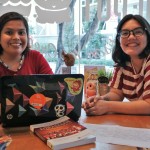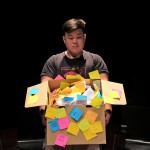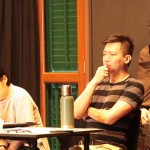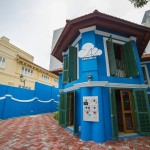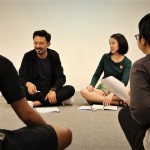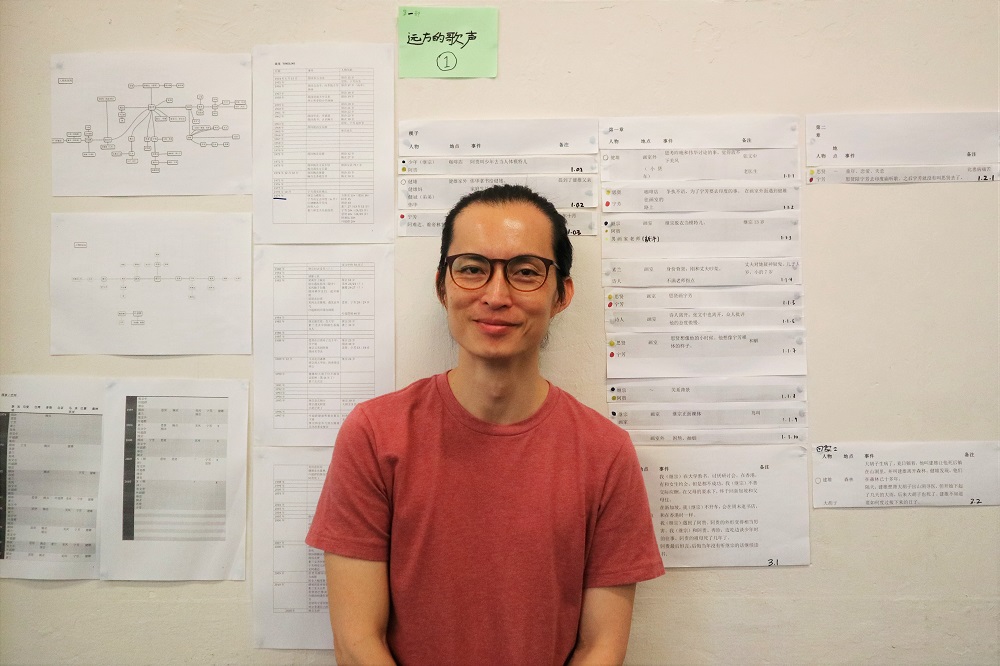
Nelson Chia stands before the timeline of Yeng Pway Ngon’s novel, Art Studio. Photo: Gwen Pew
Nelson Chia is a busy man. Just last month, Nine Years Theatre’s production of Fundamentally Happy – Haresh Sharma’s 2006 English-language play – hit the stage as part of the Esplanade’s The Studios 2017 season. It’s the first time the piece had been performed in Mandarin, and Nelson was responsible for both translating and directing it. He also gave a few talks: one at the Esplanade with Zulfadli Rashid (who had adapted another Haresh Sharma play, Hope, into Malay), and one at Centre 42 with actress Aidli ‘Alin’ Mosbit and researchers Wong Chee Meng and Shawn Chua as part of the Living Room series.
But there’s no rest for the wicked – or the artistic.
In the midst of everything mentioned above, Nelson has been taking part in Centre 42’s Fellowship programme, a grant scheme awarded by invitation that supports the research and development of a project proposed by the artist. In Nelson’s case, he embarked on an epic journey between March 2016 and August 2017 to adapt Cultural Medallion recipient Yeng Pway Ngon’s seminal Chinese novel Art Studio into a stage play. The story follows various characters who lived through Singapore’s tumultuous post-independence years.
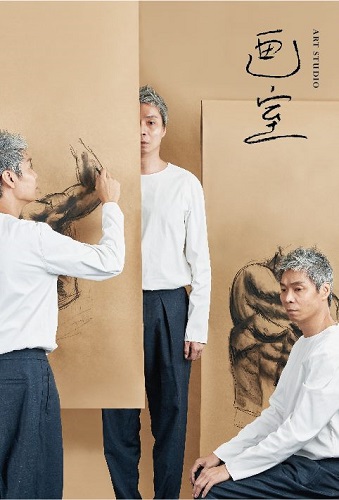 On top of being recognised for his award-winning work as an actor and director, Nelson has developed a reputation as a translator in the local theatre scene over the years. He founded Nine Years Theatre with his wife Mia Chee in 2012, and has since adapted nine classic plays – including Edward Albee’s Who’s Afraid of Virginia Woolf and Reginald Rose’s Twelve Angry Men – into Mandarin.
On top of being recognised for his award-winning work as an actor and director, Nelson has developed a reputation as a translator in the local theatre scene over the years. He founded Nine Years Theatre with his wife Mia Chee in 2012, and has since adapted nine classic plays – including Edward Albee’s Who’s Afraid of Virginia Woolf and Reginald Rose’s Twelve Angry Men – into Mandarin.
Seeing as Yeng Pway Ngon’s novel and the script that Nelson is working on are both in Chinese, the endeavour may sound like a departure from the latter’s recent work. But he has a confession: “Translation is not my personal interest,” he admits. “I never studied it and I have no real methodology – I do it more by feel.”
What he is interested in is language. Which explains his enthusiasm for the Art Studio project. He had wanted to explore cross-genre adaptation, and settled on the task of converting a local novel into a play. “Reading is quite a private activity, but theatre has an audience. You’re reading aloud, and it’s a [physical and visual] performance,” he explains. “I want to see what the novel and the stage can do that the other cannot.”
He divided the process into four stages. Phase one took place in May 2016, when he recorded six actors as they took turns reading the 496-page Art Studio out loud over the course of three days. Then, in July, he began phase two by running a series of workshops with the actors to begin exploring the text. One exercise involved them creating a physical timeline of the story – which is stuck on the wall of Nine Years Theatre’s Aliwal Arts Centre home like a tapestry – so that they could visualise the structure of the work. Phase three saw Nelson pack his bags to spend two weeks holed up in a hotel room in Bangkok to write. He came back, as promised, with the first draft of the script, which brings them to the currently on-going phase four: the test reads.
Nelson is not required to stage the work as part of Centre 42’s Fellowship, which is more concerned with the developmental process. However, his project caught the eye of Ong Keng Sen, the artistic director of the Singapore International Festival of Arts (SIFA). “Keng Sen met me and said he wanted to do something with Nine Years Theatre, so I told him about the projects I’m working on. He’s interested in Art Studio because it’s something we’ve never done before,” says Nelson. “Technically, it’s our first original work, and it’s pushing the company to do something that’s out of our comfort zone.” The play will be opening this year’s SIFA and performed at Victoria Theatre from 17 to 19 August later this year.
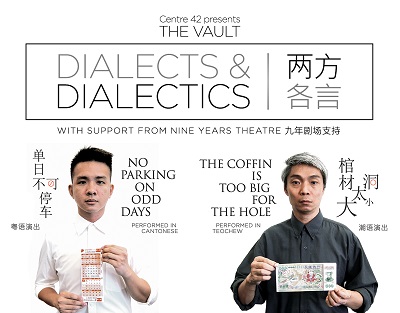 Adding to his already-full plate, Nelson is also directing a Vault presentation for Centre 42 on 5 and 6 May this year, in reciprocation of his Fellowship grant. Titled Dialects & Dialectics, the showcase is a double-bill featuring The Coffin Is Too Big For The Hole and No Parking On Odd Days, two of the most famous monologues by the late local theatre doyen Kuo Pao Kun.
Adding to his already-full plate, Nelson is also directing a Vault presentation for Centre 42 on 5 and 6 May this year, in reciprocation of his Fellowship grant. Titled Dialects & Dialectics, the showcase is a double-bill featuring The Coffin Is Too Big For The Hole and No Parking On Odd Days, two of the most famous monologues by the late local theatre doyen Kuo Pao Kun.
Both plays have been staged numerous times in English and Mandarin since they were written in the mid-1980s, but Nelson has decided to work with actors Tay Kong Hui and Hang Qian Chou to adapt Coffin into Teochew and No Parking into Cantonese. As Nelson puts it, “it’s a translation from one Chinese to another”.
As a result of the government’s 1979 Speak Mandarin Campaign, Chinese dialects have been on the decline, which Nelson believes has also eroded Chinese Singaporeans’ sense of identity and roots. Since both monologues are centred on an individual confronting the larger system, he hopes that “returning them to dialects and using a grassroot language will help bring out the plays’ sentiments”.
In playing with language in so many ways, Nelson has proved that he has come a long way since his first attempt at translation for The Theatre Practice’s 2002 production of Oleanna by David Mamet. At the time, The Flying Inkpot reviewer Adele Tan had called his translation “competent albeit sober”, and questioned why he “aimed for a straight translation and not a rewrite or adaptation”. By 2013, he’s already become a lot more confident, and he was praised by former Straits Times arts writer Corrie Tan for his “refreshing” translation of Reginald Rose’s Twelve Angry Men “that is as lyrical as it is incisive”. And judging by the way things are going, he’ll be pushing himself to try yet more new things for years to come.
But as for taking a break? Nelson shakes his head: “nothing planned yet,” he says. “Maybe a holiday at the end of the year!”
By Gwen Pew
Published on 21 April 2017
Find out more about The Vault: Dialect & Dialectics here, and register for the presentation at Centre 42 on 5 & 6 May 2017 here. More information about Nelson’s Fellowship project can be found here.

